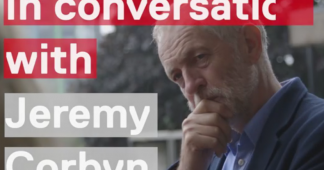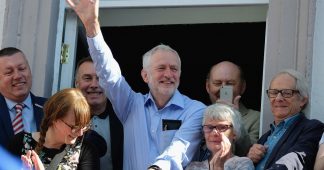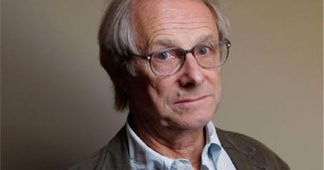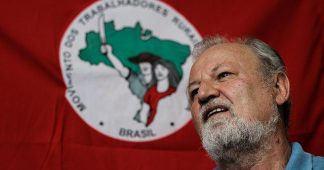Ken Loach: “They want the poor to believe that they are without power”
ORIGINAL FRENCH ARTICLE:
Ken Loach : « Ils veulent faire croire aux pauvres qu’ils sont des incapables »
by Michaël Melinard
Translated Saturday 29 October 2016,
by
Just like athletes who make victorious come-backs, Ken Loach had initially declared retirement in 2014 only to return to collect his second Palme d’Or for his new film I, Daniel Blake. Nevertheless, the British filmmaker, who turned 80 in spring, maintains a soft-spoken and humble demeanor. Before answering our questions, he asked about the fortunes of l’Humanité and our Sunday edition HD, as one would ask for news from an old comrade. So began our meeting with the filmmaker who brings the working class to the big screen as heroes.
HD. Why was it important to tell this story about a working-class man in his sixties?
Ken Loach. He’s part of a group of very vulnerable individuals. He had worked in industry and in traditional work places. He does not understand new technologies. He has health problems, but never wants to ask for anything. He’s exactly the type of individual the British government wants to exclude from their unemployment lists.
HD. How do you explain the fact that the government is running the country against the interests of its people?
Ken Loach. Our leaders are doing it consciously. They make use of people’s illnesses to lower official unemployment statistics. They know that sick people who appeal their removal from unemployment compensation often succeed. But many people are too demoralised or feel too weak to appeal. The numbers of suicides are increasing. But the government wins in the end because people lose their benefits. The problem is ideological. They want the poor to believe that they are without power and pretend not to know that roughly 2 million people are jobless. “If you haven’t got a job, it’s because your CV is no good, because you arrived late to your appointment, because you don’t understand technology or because you haven’t applied for the right jobs. Whatever the reason, it’s your own fault you lost out.”
If people didn’t accept that things were their own fault they would direct their blame towards the system. That’s what the elites don’t want because they exist to protect the system and to extend it. These ideas have always been here – if we go back to the Elizabethan era we had the Poor Laws stipulating that beggars were to be driven outside of parish boundaries. In the Victorian era, the idea existed to differentiate between the “deserving poor” and the others, to see who deserved help and who did not.
HD. Why is it so important for you to bring the working-class actors to the big screen?
Ken Loach. People’s physical presence reveals their history. The lines on their face, their behavior, their hands, their choice of food – all indicate their social class and the lives they lead. We can see poverty on the texture of people’s skin. I’ve always tried to stress authenticity. When I filmed the queue at the foodbank, I filmed a real food bank and its users…for which they were all paid a union wage. You can’t make a film about exploitation while exploiting people.
HD. What are your thoughts on Brexit?
Ken Loach. It was a complicated debate for all on the left. The European Union is a neoliberal organisation. It promotes privatisation and the subcontracting of public services. The way it treated Greece to help private enterprises buy up its public services was class politics in favour of finance. But leaving the E.U. also gave the Conservative government a window to remove the minimum protections that exist for workers and the environment. Big investors meanwhile preferred staying in the E.U. to benefit from social dumping.
To stay competitive and to make labour cheap, salaries are going to go down. Taxes will decrease and that will remove the means of financing health, education and social protections. Attacks against vulnerable people like Daniel Blake will multiply. It’s why I voted to Remain, even if I do not support the European Union as an economic organisation.
HD. What’s your view on the decision by some parts of the working class to support far-right parties?
Ken Loach. The working class is no longer represented in the Labour Party. It had been loyal to this party but throughout its entire existence this party has always supported the bosses. In 1926, during the General Strike, the Labour leader said he had nothing to do with this movement. During the 1984 Miners’ Strike, his successor repeated the same line. When workers go on strike, Labour parliamentarians are always absent. Labour has privatised and limited union rights. It has acted like a Conservative government and lost, with the passage of time, the support of the working class. While this was going on tabloid headlines were screaming “You can’t have this house but an immigrant can!” “You have to work for a starvation wage but look at all the benefits being given to this immigrant with all his children…” This poison was being produced daily. The “anti-immigrant” parties grew. The BBC, scrupulous as always, gave an immense amount of viewing time to the far right represented by Nigel Farage. The story was “what has Nigel Farage said today?” Sure, he wasn’t presented as a serious figure, but he was omnipresent. We didn’t hear the left.
Between that highly persuasive demagogue, the daily propaganda against immigration and people who feel alienated exist all the ingredients of fascism. It’s the same with Trump. There was only air time for him, none fore Bernie Sanders. I imagine it’s the same with Marine Le Pen in France.
HD. In France we are forced to respect an equality in the air time allotted to different candidates…
Ken Loach. It’s the same in Great Britain. But it’s never respected. Take Jeremy Corbyn. A university study has demonstrated that in the first 10 days of the Labour leadership election the BBC gave twice as much airtime to anti-Corbyn views as to pro-Corbyn views, which is not to mention all the mocking criticism written by its editorialists. There in a nutshell is the arrogance of the ruling class.
HD. With the arrival of Jeremy Corbyn, do you believe again in the Labour Party?
Ken Loach. Labour have always been social democrats with a right-wing leadership. They use the rhetoric of the working classes in their aim of protecting big employers. The Labour Party has always had a socialist current, which has been stronger or weaker at particular points in time, with at times a small Marxist element. With Blair, this completely disappeared. There is a small group of left-wing social democrats, people of principle such as Jeremy Corbyn and John McDonnell, who are opposed to privatisation. They even led the anti-war movement alongside people who were not part of their party. These people are walking in the footsteps of Tony Benn. Due to a tactical error by the right wing of the party Jeremy Corbyn was put forward as a candidate. They were sure he would never be elected and they would be applauded as democrats. In the end, 60% of members and supporters voted for him.
When he won, the right wing attacked on all fronts, accusing him of dividing the party. He is the first ever leader to the Labour Party to attend, in that capacity, a picket line. No other leader had ever done that in 100 years. He has proposed, if elected Prime Minister to eliminate private companies in health care provision and to renationalise public transport. Several large multinationals will lose their influence. He has not made the same commitment for other public services such as water, gas, electricity, nuclear energy…but a debate about the benefits of taking things out of private hands is unfolding. He is talking about investing public money in industry and regenerating areas that have been abandoned.
Private money would be reclaimed. It would be a big set-back for private companies which have made large profits on the backs of public services. That is why he’s being attacked. After that, the attacks will come from the World Bank, the European Commission and, undoubtedly, the United States.
All previous attempts to turn Labour into a mass party historically have failed. Now, it has gone from 190,000 to nearly 600,000 members. This man presented in the press as pathetic and unpopular has drawn nearly half a million people in Labour to transform it into the largest social-democratic party in Europe. This is incredible as this movement includes, above all, young people. I hope this proves to be a serious and substantive movement.
Published at http://humaniteinenglish.com/spip.php?article3028











